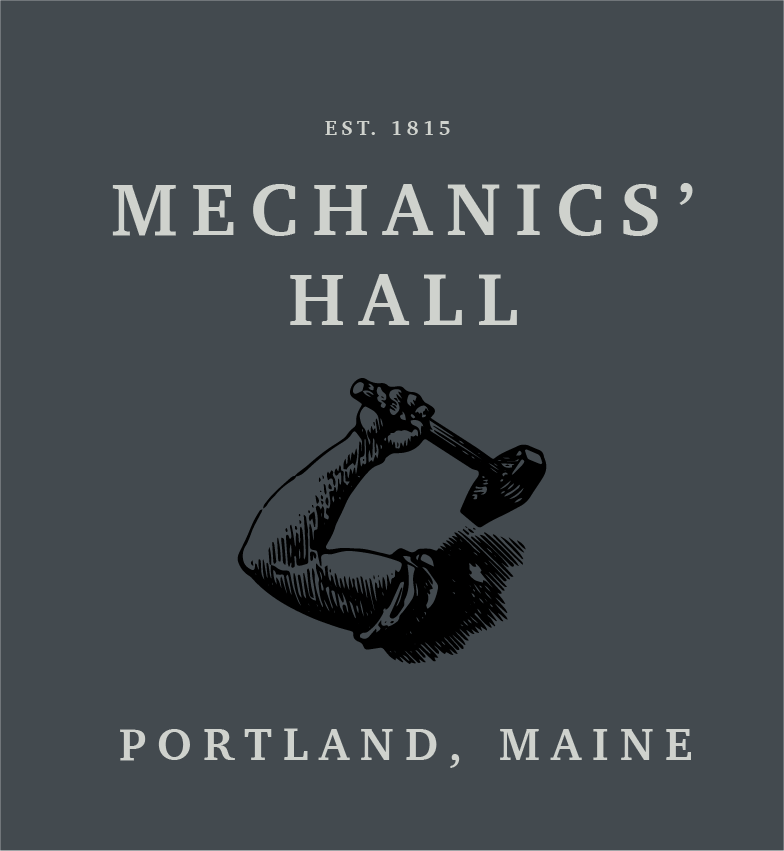
Press Highlights
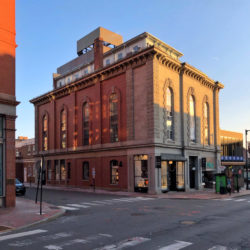
Portland Press Herald | June 2025
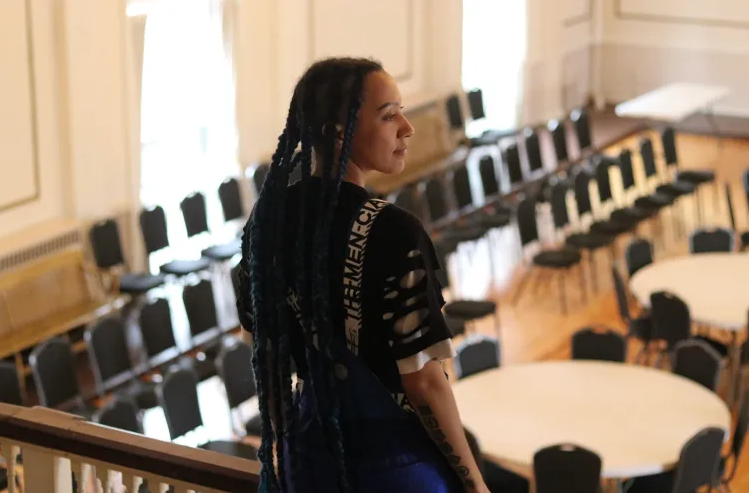
Juneteenth, Pride celebrations collide in Portland’s Prismatic Ball
The sold-out event at Mechanics’ Hall Thursday night is billed as a celebration of Black Pride, Ballroom, and queer and trans artistry among Black, Indigenous and people of color. , Staff Writer
The histories of both Pride month and Juneteenth will be celebrated at the Prismatic Ball in Mechanics’ Hall in downtown Portland on Thursday night.
The event, which was sold out, was created by Portland performance artist Aquarius Funkk, and is intended to honor Black, Indigenous and people of color in the queer, trans and gender non-conforming communities, although Funkk said it will be open to everyone.
“It is not a BIPOC-exclusive event, but it is a space where those experiences are prioritized and uplifted so that people can really see the depth of the work we are doing in this community,” they said.
Equality Community Center and Maine TransNet are partnering in the event, which was inspired by ballroom culture, a movement that first became prominent in the 1970s as a safe space for Black and Latino LGBTQ+ individuals in New York City.

Funkk, originally from Portland, helped organize the city’s first Vogue Ball at Mechanics’ Hall in 2015.
“The Prismatic Ball marks the 10-year anniversary of Portland is Burning, the city’s first vogue ball,” Katie Page, programs manager at Mechanics’ Hall said. “Its return to the original venue makes this celebration both historic and deeply resonant.”
Funkk spent nine years in the ballroom scene in Mexico City, where they drew inspiration for tonight’s event.
The date of the event, on Juneteenth, is also intentional. The ball also serves as a platform to spotlight social advocacy in Maine’s communities of color.
“This is a fun event and it’s very entertaining,” Funkk said. “But it also is a platform and a portal into all the other work people are doing in the community that might be affiliated with Black, Brown and Indigenous liberation and the work we are doing to get free, change culture and elevate our stories.”
The event will also honor the three-year anniversary of Portland activist Nicole Mokeme’s death. Mokeme was murdered by her ex-boyfriend in Acadia National Park on Juneteenth in 2022. She ran the Rise and Shine Youth Retreat, which offered wellness retreats and other programs for Black youths and adults in Maine.
“She was someone who was doing the work in the community that was really shifting the needle,” Funkk said. “She was incredibly important to the young black and brown folks that she was working with.”
René Goddess, another community activist and close friend of Mokeme, will be at the event, raising money to create a retreat space for survivors of trafficking to heal, connect with nature and participate in sustainable life practices.
THE HISTORY OF BALLROOM
The roots of ballroom culture can be traced to the late 1880s, when a formerly enslaved man named William Dorsey Swann started hosting private balls known as drags. The parties were held in secret in Washington, D.C., and involved folk songs, dances and competitions, as documented by historian Channing Joseph.
ichael Roberson, a public health practitioner, theologian and author of the forthcoming book “Ballroom: A History, A Movement, A Celebration,” said ballroom culture itself came to life during the Harlem Renaissance, when Black queer communities in Harlem felt discriminated against by their churches and community and created alternative spaces for self-expression in drag balls.
“Ballroom is part of the Black struggle for freedom,” Roberson said. “It has something to say about what it means to be human and the fight for freedom in the face of catastrophe.”
The movement evolved again in the late 1960s and early 1970s from drag balls into house balls — which kept the competition element, but incorporated a broader group of participants and involved the creation of “houses,” chosen families of people in the LGBTQ+ community.
One of the movement’s key organizers was Crystal Labeija, a Black drag queen who challenged racism in mainstream drag competitions and founded the first ballroom house — the House of Labeija — in 1968, Roberson said.
Funkk will debut their own house in Portland at the ball — the Interplanetary House of Funkk. The house will have 11 members — including a “mother” and a “father.” The house structure offers an alternative form of kinship, with LGBTQ+ people choosing families to share guidance, love and resources with.
The 1990s saw another era in ballroom, where vogue dancing became used as a way to organize and spread events across the globe, Roberson said.
Still, the movement is fairly new to Maine. “It is significant that ballroom is coming to your city, Portland, now,” Roberson said.
The Prismatic Ball is intended to be a doorway for attendees to see a cultural story and advocacy work that many have never encountered firsthand, Funkk said.
“This event is an opportunity for people to experience culture that they may not have had the chance to experience,” Funkk said. “It is a way to break down some of the walls between us.”
Portland Press Herald | January 2024
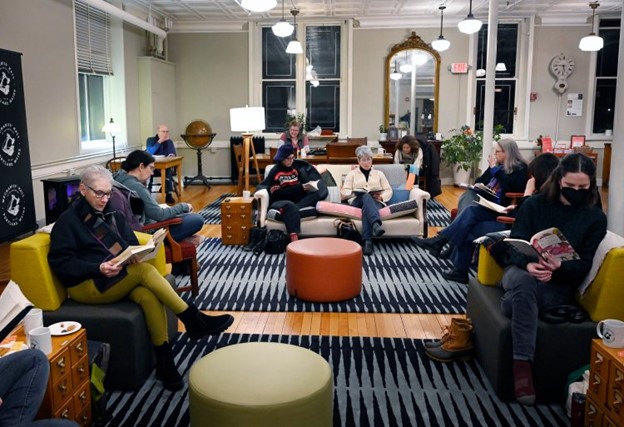
In Maine libraries, stores and cafes, silent book clubs quietly catch on
In what might be described as post-pandemic plot development, social events are popping up that appeal to people who love to read, creating community and helping to make their worlds ‘a bit bigger.’
Posted January 28. Updated February 1
Megan Gray, Staff Writer
The library at Mechanics’ Hall in Portland hummed with chatter. Patrons selected an orange from the snack table and claimed a comfortable armchair. April Davis slipped off her shoes. Keziah Weir claimed a spot at a long wooden table. Then Annie Leahy rang a tiny bell, and the entire room hushed.
Eighteen people opened their books and started to read.
This scene was not entirely unusual. This is a library, after all. But this was Quiet Nights, a new book club at Mechanics’ Hall. Sort of. There is no required title or structured discussion. Instead, everyone brings whatever they want to read and spends a silent hour doing just that. Weir described the time as almost sacred.
“I don’t ever end an hour of reading and regret it, and I end a lot of hours of other things and regret that,” Weir, 32, said. “It just feels like such a good reminder of a thing that is consistently life-sustaining.”
“I don’t ever end an hour of reading and regret it, and I end a lot of hours of other things and regret that,” Weir, 32, said. “It just feels like such a good reminder of a thing that is consistently life-sustaining.”
“It feels like going and taking your brain to the spa,” she added.
This meetup is part of a growing trend, popularized in part by the national Silent Book Club. Guinevere de la Mare and Laura Gluhanich started what became the first official chapter in San Francisco more than 10 years ago. They lived on the same street and occasionally met at a wine bar between their houses. When de la Mare lamented that her job and her toddler left her with little time to do the reading for her book club, the friends committed to finish a chapter at the bar before they could close their books and catch up.
The idea spread among their friends and on social media, and today, the Silent Book Club has more than 600 chapters around the world. But the concept didn’t truly explode until people started to emerge from the isolation of the COVID-19 pandemic. Last year, 400 new clubs were formed, including official chapters in Portland and Biddeford. And that doesn’t include unaffiliated but similar events such as Quiet Nights.
Want to socialize but don’t really remember how? Here’s an answer.
“I think there was a real hunger for what Silent Book Club offers, which is a structured, low pressure, quiet and calm way to go out and socialize,” said de la Mare, who now lives in Hawaii. “That really spoke to a lot of people who were trying to ease back into being out in the world.”
AN INTROVERT’S HAPPY HOUR
Bekah Robertson has never wanted to be in a book club before.
Robertson, 23, loves to read fantasy novels and works as a barista at Elements in Biddeford. When her coworkers decided to launch a Silent Book Club, she thought it sounded perfect for her.
“That is everything I like about regular book clubs and gets rid of all the things that I don’t like about book clubs,” she said. “I really like being around other book lovers, talking about other books, and reading in a group. I really hate being forced to read a specific book. I don’t have to force myself to read a book that everyone else is reading. I don’t have to share an opinion about a book that I don’t like to a bunch of strangers. It’s the best parts of a book club.”
General manager Caitlin Swider and events manager Sara Thomas were looking for new programs for Elements when they heard about Silent Book Club on social media. It’s billed as happy hour for introverts. Could anything be more fitting for a combined bookstore and cafe? Seventeen people showed up for the first meeting. It has been so popular that Elements has expanded the event to twice a month – the second Sunday afternoon and last Thursday evening.
The event is flexible from club to club, but it usually follows a similar format. At Elements, the first half-hour is for mingling and chatting. The staff switches the music to something ambient to signal the start of reading. An hour later, the tunes become more upbeat. Some people put a bookmark in place and head home, but others stick around to socialize.
“Stereotypical book clubs, there’s a lot of pressure to have an opinion and speak out,” Swider said. “With this, if you want to talk, you talk.”
Thomas puts out a sign-in sheet where people can also write down what they are reading. Preferences range widely – on one recent night, the list included “I’m Glad My Mom Died” by Jennette McCurdy (a memoir), “Portrait of a Thief” by Grace D. Li (a novel about a heist of Chinese art), “Prince Caspian” by C.S. Lewis (an installment of the fictional “Chronicles of Narnia”) and “Chaos: Charles Manson, the CIA and the Secret History of the Sixties” by Tom O’Neill with Dan Piepenbring (nonfiction) – but recommendations also move quickly through the group. Thomas picked up “Babel” by R.F. Kuang because she heard positive reviews from others on Thursday nights.
“It’s hard to find ways to meet new people and create a community,” Thomas said. “If you’re like, I like to read and that seems like an easy event to attend, it also becomes an easy way to meet new people and create community, to make your world a little bigger.”
MAKING THE TIME TO READ
OK, so, reading quietly is not exactly groundbreaking or new.
But it can take a little discipline. Marjorie Moore reads all the time – in her Munjoy Hill art studio, after dinner at her Portland home – but even she has titles that have been gathering dust.
So when she attended her first Quiet Night at Mechanics’ Hall, Moore brought a book she had been trying to read “for decades,” she said: “On Longing: Narratives of the Miniature, the Gigantic, the Souvenir, the Collection” by Susan Stewart. An hour later, she found herself two chapters deep with a greater understanding than she had gleaned on previous attempts.
“It brings back the concept of when I was in school and you’re in a library and it’s quiet, and all you really hear are chairs moving or books being put down on a table,” Moore, 79, said. “I think it gives people the incentive to think about what they’re doing and focus, in the camaraderie of other people.”
Annie Leahy, executive director of Mechanics’ Hall, a communal gathering space on Congress Street, said that camaraderie was the whole idea behind Quiet Nights. Daylight saving time was ending, and days were getting shorter.. The team was looking for events that could combat the isolation of winter, and a volunteer mentioned that a friend had attended a silent reading event in another city. Quiet Nights is free to Mechanics’ Hall members and $10 for everyone else, and the first one sold out 25 spots within three days.
“That time to pause, we don’t often allow ourselves enough of that,” Leahy said. “I love to read, and I run an organization with a library, and I have such a hard time carving out that time for myself. In some ways, we have created an opportunity for people to claim an hour of time.”
Weir is a senior editor at Vanity Fair and launched her novel “The Mythmakers” at Mechanics’ Hall last year. She lives in South Portland and heard about Quiet Nights via the organization’s email newsletter. She often reads and writes in libraries and bookstores, but she liked that this event was at night but not at a bar.
“Everybody is really just sitting and reading,” she said. “Nobody is on laptops, and nobody is on their phones. It just feels like a very unique experience. It feels like a space of worship.”
Davis, 38, has already reserved a spot in Quiet Nights for every Monday in the foreseeable future. One week this month, she read “Tributaries: Essays from Woods and Waters,” a memoir by her friend Ryan Brod. She felt vulnerable at first because the book was making her both laugh and cry.
“Books do that,” she said. “It’s nice to share that space and be around others who might be tearing up or giggling too. If you’re with people who are in that event, they get it.”
‘A COMMUNITY OF READERS’
The living room at the Blind Tiger guest house on Danforth Street in Portland is made for reading.
The fire is warm. The couches are plush. The ambiance is cozy.
“It’s definitely a treat,” Kate Hassett, 37, said. “I live in a little apartment, and it’s fun to go to this giant boutique inn and feel fancy for a couple hours.”
Tammara Croman, the general manager, was looking for events that would open the guest house to locals, not just visitors. She heard about the concept on social media, contacted the national Silent Book Club to list the Blind Tiger chapter on its online database, and hosted the first free event in October.
She felt the need for community spaces is even greater in the wake of the COVID-19 pandemic.
“We were so separated for years, and I think people had a hard time reconnecting with those they loved, let alone new people,” Croman said. “To be able to help facilitate a space where people from different neighborhoods, different walks of life find a common interest, it’s a really cool thing.”
Some months have drawn 10 or more people, but the expansive rooms have plenty of soft seats. Hassett lives in the neighborhood and works as a licensed clinical social worker at Maine Medical Center, and she first heard about the book club on Instagram. She has now attended multiple times, on her own and with friends. Once, the attendees pitched in money for a bottle of wine from a nearby shop. Hassett has set a goal to read a different book on each visit to the Blind Tiger, and she said that plan has motivated her to read more between meetings as well.
“Reading is such an individual thing, but there’s such a community of readers and writers in this area,” she said. “It keeps me connected. … I’ve been seeking more communal things since the pandemic, and it took some time to warm up again.”
On a recent Wednesday evening, five people wandered into the Blind Tiger to read. They smiled and nodded to each other, shedding coats and selecting a comfortable chair.
Soon, the only sound was the fire crackling – and pages turning.
Portland Press Herald, July 2023

A city growing in diversity is attracting more diverse theater this summer
Arts residency Hogfish opens ‘CarmXn’ on Wednesday, and Portland Theater Festival is in rehearsals for ‘Sanctuary City.’
BY MEGAN GRAY, Portland Press Herald
Sherlindary Berrios stood in the center of the room at Mechanics’ Hall in Portland and stretched out her hand. The fortune teller spoke first in Dari, then Spanish.
“You will drink much water in a foreign land,” she told Berrios.
Berrios was rehearsing the opening scene of “CarmXn,” a reinterpretation of the classic opera by Cape Elizabeth-based arts residency Hogfish. She came to Maine 10 months ago from Venezuela and is now a student at Deering High School. She dreams of becoming an actress and has joined a diverse professional cast for her first role.
Two young theater companies are presenting works in Portland this summer that center on immigrant stories. “CarmXn,” which has three performances starting Wednesday, moves the classic opera from 19th century Spain to the present day at the U.S.-Mexico border. “Sanctuary City,” a play by Martyna Majok about undocumented teenagers in the wake of 9/11, will close the Portland Theater Festival in August.
Both companies said they feel these productions are critically important at this moment. Over 1,000 asylum seekers have arrived in Portland this year to start new lives in a safer place, and city officials and residents are still grappling with the best response.
“The question of immigration and new American life, it’s coming to a head in our community in new ways that are different from ways that we’ve experienced it in the past,” said Dave Register, who founded the Portland Theater Festival in 2021.
Reza Jalali, executive director of the Immigrant Welcome Center in Portland, agreed that theater is an important tool to tell and hear the stories of New Mainers.
“More than passing laws and regulations, in order to humanize one community or another, art plays a role,” said Jalali. “It really helps us to understand the factors that we might not be aware of.”
TESTING BOUNDARIES
Maria Brea has sung the part of Micaëla in the opera “Carmen” 12 times. But never like this.
“It’s more human and more real,” said the soprano, who is based in New York City and in the cast of “CarmXn.”
Edwin and Matt Cahill, husbands and founders of Hogfish who adapted the familiar opera in a new setting, said the original by French composer Georges Bizet was shocking to its early audiences because the title character was a woman who broke convention. She did not wear a corset or shoes, she smoked cigarettes, she lived outside the traditional boundaries of society.
“So we’re going back to those roots,” said Edwin Cahill.
“And asking how does this resonate today in a way that it did back then?” added Matt Cahill.
They decided to explore the concept of boundaries: of geopolitics, gender, genre. CarmXn is an undocumented Afro-Caribbean immigrant, and Don José is an officer for U.S. Immigration and Customs Enforcement with a French-Canadian background. The bullfighter (toreador in Spanish) is recast as a drag performer (named Tori Adore). The traditional score is supplemented by mariachi band orchestration and an electronic flamenco dance party. New dialogue is spoken in English, Spanish, French and Dari (a language spoken in Afghanistan).
Brea, who is originally from Venezuela, said thinking about Micaëla as a multilingual immigrant added a depth to the role that she had never considered before and that she will use in the future.
The characters in this version all seem more complex than the stereotypes that can define them in other productions, she said. Brea also will bring musical influences from her native country to her performance for the first time as she plays the ocarina and sings an Afro-Venezuelan chant.
“Everyone is going to be doing something very interesting and very personal,” she said.
ACCESSING ART
While working on “CarmXn,” Edwin Cahill traveled to volunteer with Abara, a nonprofit that works between El Paso in Texas and Ciudad Juarez in Mexico. Hogfish, which is in its second season, is partnering with that organization to bring “CarmXn” to the border itself in the future. They have been thinking about how that border is far away but still has connections to Maine: through asylum seekers who made that perilous crossing to come here, or the local operations of U.S. Immigration and Customs Enforcement.
With that in mind, they reached out to Jalali at the Immigrant Welcome Center. Jalali met with the cast to help them learn more about the immigrant community in Maine and share his own story as an Iranian Kurd who came to the United States as a refugee. He told them about the words a fortune teller told his mother when he was just a baby: “Your son is going to drink lots of water in a strange land.” His mother wept, realizing her infant would someday be separated from family and country. The cast of “CarmXn” asked Jalali if they could incorporate his story in the opera, and that prophecy will be echoed in the newly written opening scene with Berrios.
Jalali, who also has written a play, worked with Hogfish to find local immigrants who could perform in guest roles. He also will help distribute free tickets to those who could not otherwise afford them. He said New Mainers often face barriers to participating in the local art scene.

Matthew Anchel sings during a rehearsal of CarmXn on Friday. The adaptation of the classic opera explores the concept of boundaries: geopolitical, gender, genre. Photo by: Gregory Rec, Portland Press Hearld
“The cost of really accessing art, be it at the museum or the Merrill Auditorium or the concerts, is quite high, and it’s getting higher with this inflation,” said Jalali. “At a personal level and as an advocate for low-income New Mainers, I’ve always been struggling with how a family of four could afford to go and listen to music or go to see a play or go to the community’s museum. We’ve got to address it as a community that we are denying some people because of their income status from accessing art and culture. Art has to be accessible to all.”
The Cahills said they hope their adaptation of “CarmXn” shares a message of hope, community and freedom.
“I really feel like this story has a little something for everyone, whether you’ve grown up in Maine like I did, you’re a gay man, you’re a Latinx community member who’s recently here, or someone from Africa coming here, or someone from Quebec who is visiting for the summer,” said Edwin Cahill. “At the end, we all see how many similarities we have rather than differences and how powerful that can be.”
NEED FOR NUANCE
Meanwhile, rehearsals are underway for “Sanctuary City,” which focuses on two immigrant teenagers in post-9/11 Newark, New Jersey, who have come to rely on each other as they navigate the challenges of being undocumented in America and try to realize their dreams.
The writer, Majok, is a Polish immigrant who won a Pulitzer Prize in 2018 for an earlier play, “Cost of Living.” In “Sanctuary City,” she did not give the lead characters full names (they are “B” and “G”) or specify their countries of origin. She requests only that they not be played by actors of Western European origin.
Shawn Denegre-Vaught, who plays B, lives in New York and is the son of immigrants from Costa Rica and Mexico. He said he saw humanity in the script that drew him to the characters, and working on this play has given him the opportunity to ask his family questions about their own story that he has never posed before. He described “Sanctuary City” as “a love letter.”
“When I first read the play, I felt myself crying tears of joy to have that recognition and to finally feel represented as someone who loves my culture, my family, and also tears of resentment because of the brutality immigrants must endure,” he said.
Register, the Portland Theater Festival founder, grew up in Cape Elizabeth and returned to Maine from Los Angeles during the pandemic. He aims to bring diverse stories to the festival and sees “Sanctuary City” as a timely piece for Portland. While the state has become more diverse than when he was young, he said, the ongoing debates about how to respond to an influx of asylum seekers remind him that more change is needed.
“I look around today, and I sense a lack of nuance still, and we’re talking about nearly 25 years later,” he said. “I wanted to do a play that in its own way contributes and plays a small part in providing a little more nuance to the conversation around immigration in Portland. I wanted the immigrant experience to be represented on stage.”
He plans to partner with local groups to engage the city’s immigrant community in the play and make sure it is accessible to those who want to see it. Also in the audience will be Denegre-Vaught’s family.
“Hopefully, they feel seen,” he said. “I’m doing this play for them too.”
Portland Press Herald| December 2022
Historic Portland building has quietly become an arts and literary hub
The 172-year-old Mechanics’ Hall on Congress Street, which has endured change all around it and prolonged periods of uncertainty, is well-positioned to serve a variety of creative needs in years to come.
PostedDecember 24, 2022
Eric RussellPress Herald
The building almost didn’t survive.
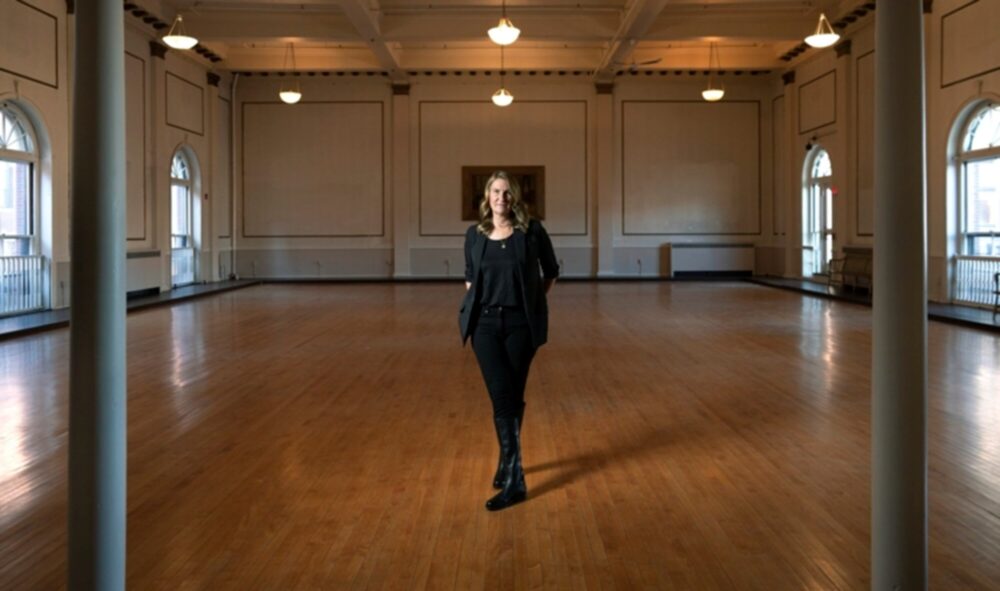
Annie Leahy, executive director of Mechanics’ Hall in Portland, stands in the Grand Ballroom of the building. The hall recently received a national significance designation from the National Park Service, which allows it to apply for various types of funding. The hall has become a literary and creative arts hub over the past few years. Gregory Rec/Staff Photographer
In the 1970s, the handsome mid-19th century stone-and-brick Mechanics’ Hall in the heart of Portland’s downtown, was nearly sold to a bank that was headquartered next door.
“They wanted to tear it down to expand the bank, but the board of Mechanics’ Hall was adamantly opposed,” said Dick Spencer, a local attorney who for years has been involved with the historic building and the somewhat obscure organization that owns it. “So, by luck and pluck, it’s still there.”
It has taken time and patience, but Mechanics’ Hall has quietly yet purposefully transformed itself from an underused gathering space to a major player in the downtown arts and culture scene, hosting intimate concerts, dance and theater performances, literary events and more.
In the process, a building that once served as a mustering station for union soldiers during the Civil War and as a temporary City Hall after the Great Fire of 1866 but had been closed to the public for decades in the 20th century has been revived.
Its future could be even brighter, too.
In November, Mechanics’ Hall was designated a Nationally Significant Landmark Building on the National Register of Historic Places, which will open funding opportunities to renovate and preserve the building for generations to come.
“There is a real sense of community building that we’re trying to be intentional about,” said Annie Leahy, executive director of Mechanics’ Hall. “When people come into this space, we want them to feel like it’s theirs.”
Local artists across a variety of disciplines already say the building, which includes an open and inviting library space on the second floor for smaller events and a grand ballroom on the third for larger ones, is unlike any other in Portland.
“It’s a gorgeous aesthetic space and, acoustically, it’s stunning too,” said Maya French, co-artistic director of the classical music ensemble Palaver Strings, which has performed at Mechanics’ Hall a dozen times over the last five years. “It’s so nice for Portland to have a place that’s completely flexible in the way it’s set up.”
Although Mechanics’ Hall has developed broad appeal among performers, it has perhaps stood out most as the gathering place of choice for literary events, such as book launches. Well-known Maine authors Lily King and Susan Conley, among others, have chosen to introduce their latest novels there, and this summer the National Book Foundation hosted an event at the hall.
“It’s certainly a place our members are asking about more,” said Gibson Fay-LeBlanc, executive director the Maine Writers and Publishers Alliance. “I think for a long time a lot of people just didn’t know what it was.
“Portland has changed so much in recent years, so it’s great to have these places that have remained and brought into present day.”
REPURPOSED BUT IN PERIL
Mechanics’ Hall was built at 519 Congress St. in 1850 by the Maine Charitable Mechanic Association, a group of artisans and craftsmen looking for a gathering space for scholarship.
Local architect Thomas J. Sparrow designed the building, and in the late 19th century, famed architect John Calvin Stevens was brought in to design the iconic ballroom. Stevens later taught free technical drawing classes there.
At one point, there were dozens of Mechanics’ Halls like it across the country, but most have either been sold, or folded into libraries or universities.
In Portland, the association regularly hosted events, including musical performances, dances and lectures, for members, but membership started to dwindle in the early 20th century. By World War II, the building was still owned by the association, although it was little more than a landlord.
The library, which contains more than 30,000 titles, remained, but the rest was divided up and leased to local businesses. Even the high-ceilinged ballroom was converted into offices with the help of temporary walls.
“People didn’t even know what was in there,” Leahy said.
The association made enough money through leasing space to keep the lights on, but much-needed maintenance was often deferred. In 1973, Mechanics’ Hall was added to the National Register of Historic Places, a distinction that essentially means the building is worthy of preservation. Unfortunately, no money came with it.
Spencer became a member of the Mechanic Association in the early ’80s. At that time, he said, there were fewer than 100 members left, and most were over the age of 80. He said he visited the building only twice in that time but kept sending his membership check.
“It sounds ridiculous, but I had this feeling that eventually the people running it would be gone and there would be this fabulous building,” he said.
He was right. By the early 2010s, Spencer and other board members, including former Portland Mayor Pam Plumb, started planning for what the building could become.
In 2014 and 2015, the building underwent renovations to the second and third floor, which allowed the ballroom to open to the public for the first time since 1943.
Slowly, groups began to seek it out, in large part because of its size and charm. A library book club. Monthly swing dances. A lecture series.
The library, once open only to members, became a public space.
But the building needed more work to survive. Just last year, Portland Landmarks listed Mechanics’ Hall as one of its “Places in Peril.”
“Mechanics’ Hall’s problems have been compounded by the stopgap nature of maintenance efforts periodically undertaken throughout the history of the organization, which has never possessed the capital to properly address them,” the organization said last year. “Moreover, the MCMA is running out of time to act, as waiting any longer threatens to deepen existing structural issues as well as create new ones which would jeopardize the building’s continued survival.”
LOOKING AHEAD AND PRESERVING THE PAST
The hiring of Leahy in September 2019 as the hall’s first full-time executive director has been a game changer. Prior to that, the building was run by a board of directors, all volunteers.
Leahy previously worked as a journalist, including for Peter Jennings at ABC News, and was involved in the creating and production of the Tribeca Film Festival, founded in 2002 by actor Robert De Niro.
But she’s been coming to Maine with her parents, who owned a summer place on Little Diamond Island in Casco Bay, since she was a kid and moved here permanently in 2009.
Like so many others, Leahy was unfamiliar with Mechanics’ Hall. She has since become “the building whisperer,” according to Spencer.
“She’s allowed the groups that might have interest to use it and take advantage, so there has been this organic growth that’s being dictated by the building itself and the community itself,” he said.
Leahy has helped improved the financial picture, too. In 2017, revenue for Mechanics’ Hall was $182,000, according to tax documents. Last year, it was $306,000.
The street-level floor is still rented out for retail, most recently to an art supply store and the Maine Crafts Association, which showcases a gallery of members’ work there.
The second and third floors, meanwhile, have become sought after for a variety of arts and literary uses.
In March 2020, just before the coronavirus pandemic shut everything down, Mechanics’ Hall hosted a book launch by author Lily King for “Writers & Lovers.”
“Every seat was full, and more people were standing,” Leahy said. “In that moment, it really felt like we had all the pieces right here in this space.”
The pandemic delayed momentum slightly, but in the last year, Mechanics’ Hall has hosted 50 literary programs and book launches, including a National Book Foundation event, 21 art installations and maker events, 10 musical performances and more.
This summer, the inaugural Portland Theater Festival hosted one of its three productions inside Mechanics’ Hall. More recently, a concert by world-class Irish fiddler Kevin Burke was held inside the ballroom. Palaver Strings continues to play there, too, and has a show planned for March.
With a capacity of 178, the ballroom is the perfect size for a specific type of performer.
“The ballroom is an intimate space, there is nothing like it. There is no stage, so performances are happening on the same level as the audience,” Leahy said.
The building’s most pressing need is a new roof, estimated to cost $1.8 million. The top floor remains unused, too, but Leahy has begun thinking about possible uses for the future. The recent designation as a landmark by the National Register of Historic Places has the potential to be transformative.
“The designation was a catalyst for us, because without it, there are funding resources that we couldn’t access,” Leahy said. “And I think investing in the hall is investing in the larger picture for Portland.”
As the building changes to accommodate the increased interest among artists, Leahy said the history will be preserved too. It will remain what it was when it was founded, as a humanities center of sorts, brought into the modern age.
“There has been so much thought about what’s the best future use of this building. And I think it’s become apparent that it can be a center for a variety of literary and performing arts. There are a lot of organizations that don’t have a physical home.
“Artists need space to create.”
Mechanics’ Hall | November 2022
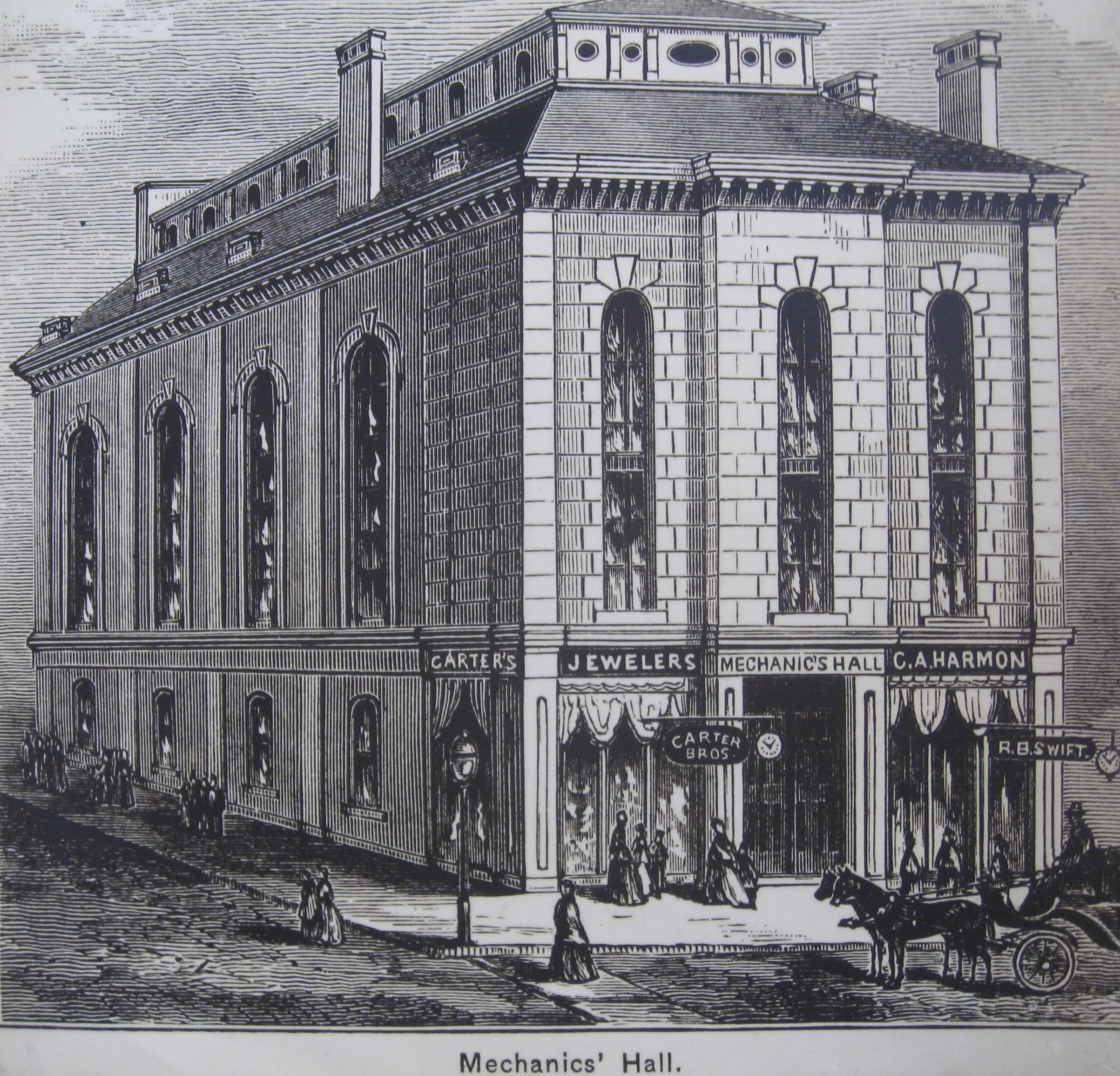
Mechanics’ Hall in Portland Receives Long-Awaited
National Significance Designation from National Register of Historic Places
Prestigious nomination opens door to funding and preservation opportunities for landmark building as part of five-year strategic plan
PORTLAND, Maine – Nov. 7, 2022 – Mechanics’ Hall, a 163-year-old building located at 519 Congress Street in the heart of Portland’s Arts District and formerly known as the Maine Charitable Mechanic Association, is now listed as a Nationally Significant Landmark Building on the National Register of Historic Places after a rigorous application process, and nearly 50 years since the building was first listed as a Local Landmark within the Registry. The new designation will help to draw attention to the building and its urgent preservation needs, as well as open up funding opportunities on a federal level.
“Mechanics’ Hall is thrilled to receive this significant upgrade to our historic status,” said Executive Director Annie Leahy. “The Hall is a stunning representation of Portland’s cultural history and is overdue for repairs that will help preserve this beautiful building and ensure its legacy and influence for decades to come.”
The National Register of Historic Places is the official list of the Nation’s historic places worthy of preservation. Authorized by the National Historic Preservation Act of 1966, the National Park Service’s National Register of Historic Places is part of a national program to coordinate and support public and private efforts to identify, evaluate, and protect America’s historic and archeological resources.
Designed by Maine’s first architect, Thomas J. Sparrow and built from 1857-59 by the Maine Charitable Mechanic Association, the building houses a lending library, grand ballroom, boardroom, and small classroom, which is often used as a gallery space. Mechanics’ Hall has two ground floor commercial rental spaces currently occupied by The Art Mart, an art supply store, as well as the Maine Crafts Association, which opened its first Portland store in the summer of 2018.
“This important designation recognizes the magnificance of our Italianate-style building,” said former Board Chair Paul Stevens, “and acknowledges the early work of our members to support Maine’ sartisans and craftspeople.” Stevens’ great-grandfather, the architect John Calvin Stevens, designed the grand ballroom on the third floor of Mechanics’ Hall.
“Getting people inside, particularly on the heels of the pandemic, has been critical to raising awareness that, in a city seeing rapid growth and new development, Mechanics’ Hall is wonderfuly old and deserves to be saved,” said Leahy.
Mechanics’ Hall Press Release Page 1
Leahy was appointed Executive Director in 2019 by the board of directors in a concerted effort to position the organization as a cultural resource. In just three years, Mechanics’ Hall has become a sought after arts and cultural destination that welcomes approximately 500 people through its doors every month.
In the last year alone, the Hall has hosted 50 literary programs and book launches, including partnerships with the National Book Foundation and Maine Writers and Publishers Alliance, as well as 10 musical performances, 21 art installations and maker events, and other performances in collaboration with Portland Ovations, the Portland Chamber Music Festival and the Portland Theater Festival.
Despite programmatic success, the Hall is in dire need of a new roof, a project that is estimated at $1.8 million. The National Significance designation will provide additional opportunities for Mechanics’ Hall to apply for federal funding for building repairs and restoration.
In 2021, Greater Portland Landmarks listed Mechanics’ Hall on its 6th “Places in Peril” listing, which calls attention to threats facing community-defining, historically-significant places in the Greater Portland area.
“This new National Significance designation will help raise awareness to a wider audience of supporters and that is critical to help ensure that The Hall remains a living connection to Portland’s past while serving the organization’s long-standing mission, ‘to make knowledge, ideas, and arts accessible, ” says Sarah Hansen, Executive Director of Landmarks.
The organization completed a five-year strategic plan in 2022 that positions Mechanics’ Hall as a vital community resource and partner for individuals and organizations working in arts and humanities. It also includes prioritizing the stewardship and preservation of their historic building as a substantial contribution to the cultural sector in Maine.
“The Founders of Mechanics’ Hall understood that literary arts and humanities give voice and dimension to our community and help us to make sense of the world,” said Board Chair Bill Stauffer. “This National Significance recognition acknowledges the importance of saving places like Mechanics’ Hall in our city.”
“Mechanics’ Hall has been a landmark in downtown Portland since 1859. Its stately presence on Congress Street bears witness to the vital contributions that the Maine Charitable Mechanic Association and its members have made to the creative life of the city for more than two hundred years,” says Maine State Historian Earle G. Shettleworth, Jr.
###
ABOUT MECHANICS’ HALL:
In 1815, the Maine Charitable Mechanic Association formed to support Maine’s creative community: they were blacksmiths, coopers, artists, innovators and creators. Between 1857 and 1859, they built Mechanics’ Hall in Portland – a communal gathering space with a library at its center. Today, Mechanics’ Hall celebrates that rich history through literary arts programs, music, performance and more while working to restore its landmark building as a vibrant cultural resource.
To learn more, please visit Mechanics’ Hall at mechanicshallmaine.org and follow the organization on Instagram @maine.mechanics for weekly programming and community updates.
MEDIA INQUIRIES:
Claire Jeffers, Jeffers.Claire@gmail.com, 703-622-9012
Mechanics’ Hall | Feb 2021

MECHANICS’ HALL ANNOUNCES “SHARE THE LOVE,”
a free membership program for Portland Public School staff members.
Portland, Maine: Mechanics’ Hall, in partnership with the Foundation for Portland Public Schools, has announced a new initiative to provide free membership to all Portland Public School staff. Called “Share the Love”, the program gives any staff member who chooses to participate a free one-year membership, which includes access to the organization’s borrowing library, events, and educational programs.
“The past 12 months have been some of the most difficult for our community. And still, many – including Mechanics’ – have experienced incredible generosity, showing us how fortunate we are here in Portland, Maine,” said Executive Director Annie Leahy. “The kindness shown to us by members, patrons, and new friends has been tremendous…” Read full press release here.
Mechanics’ Hall | Sept 2020
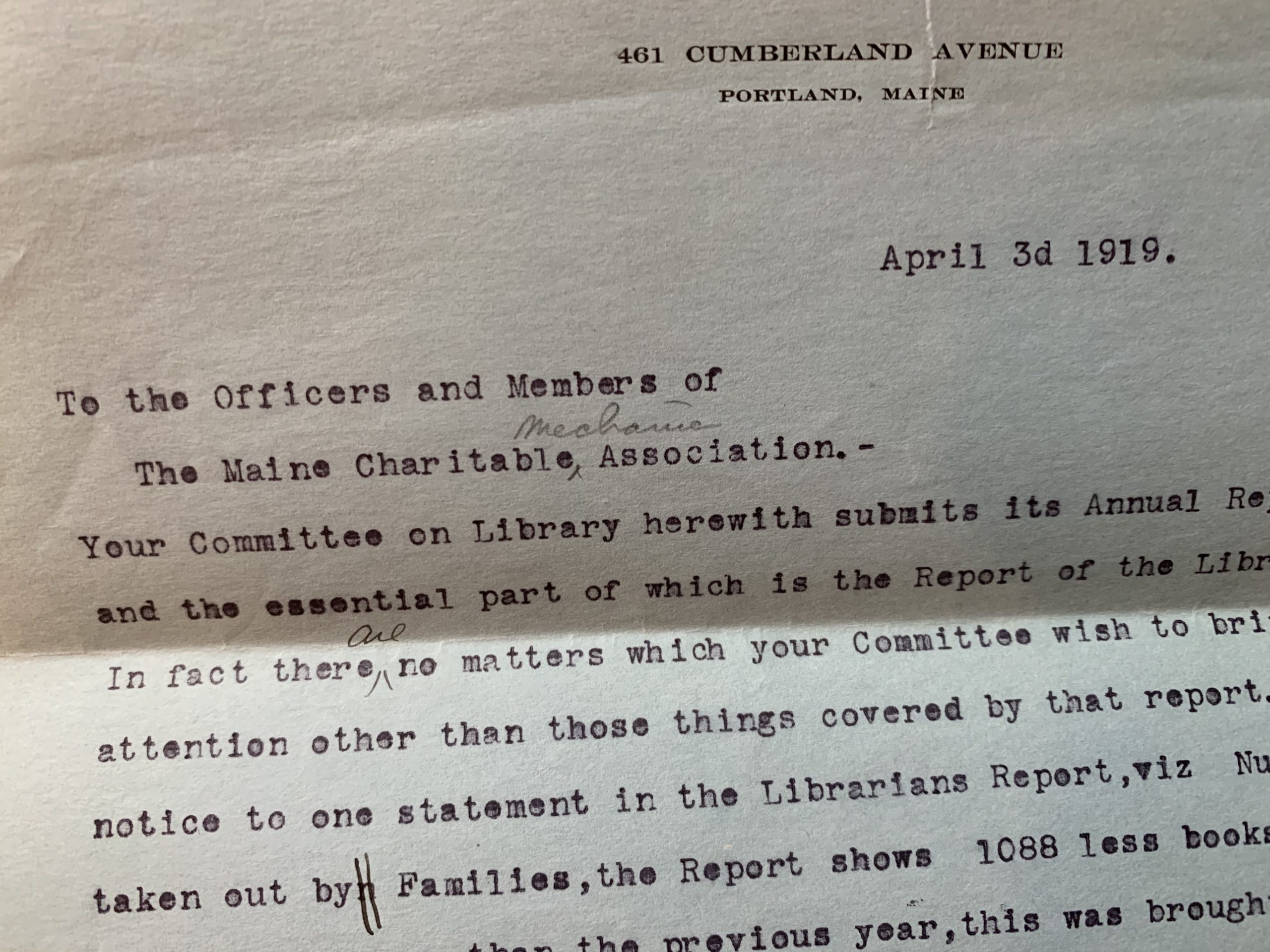
A Letter to Our Community
By Annie Leahy, Executive Director & Paul Stevens, Board President – Not long after the current pandemic forced us to close the Hall to the public in March, we began to wonder what we might learn from the generation of mechanics who endured the flu pandemic of 1918. We searched through our accessible archives, hoping to unearth a cataloged letter or report to gain a bit of wisdom from their hardship that might ease our own. We could find nothing. Read the full letter here.
Maine Home + Design | Feb 2020
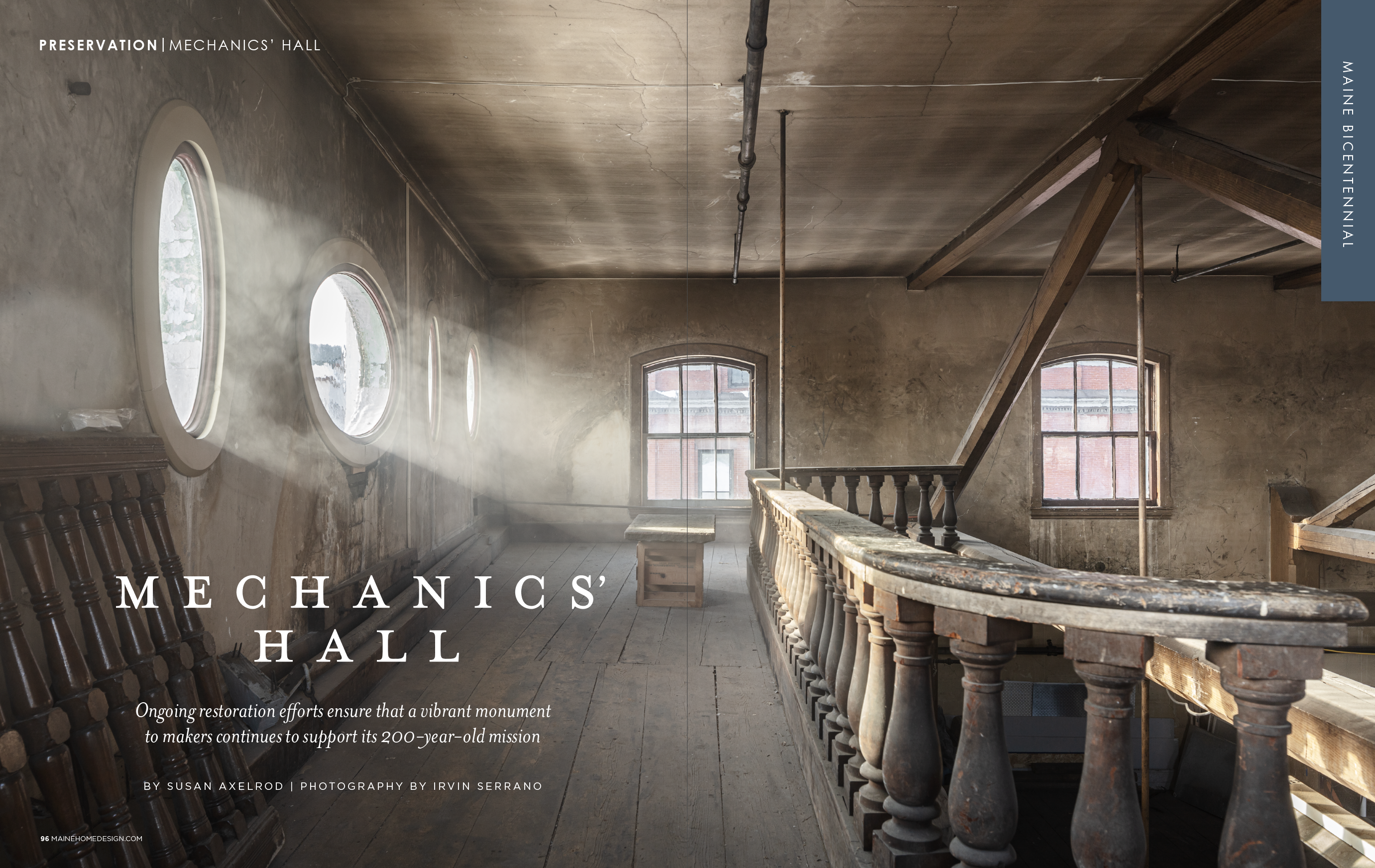
Mechanics’ Hall – Ongoing restoration efforts ensure that a vibrant monument to makers continues to support its 200-year-old mission
By Susan Axelrod – In addition to its highly visible architecturally significant buildings and spaces, Portland has a number of gems that are, in effect, hiding in plain sight: the Portland Masonic Temple, Wilde Memorial Chapel in Evergreen Cemetery, and the garden at the Wadsworth–Longfellow House, to name a few. Just a block from the garden is another hidden jewel: Mechanics’ Hall. Like its other Congress Street neighbor, the Masonic Temple, Mechanics’ Hall has storefronts facing the street, which help to keep the 160-year-old building’s larger purpose under wraps, as well as provide income for its owner, the Maine Charitable Mechanic Association (MCMA). Full article here.
Portland Press Herald | 11.4.19
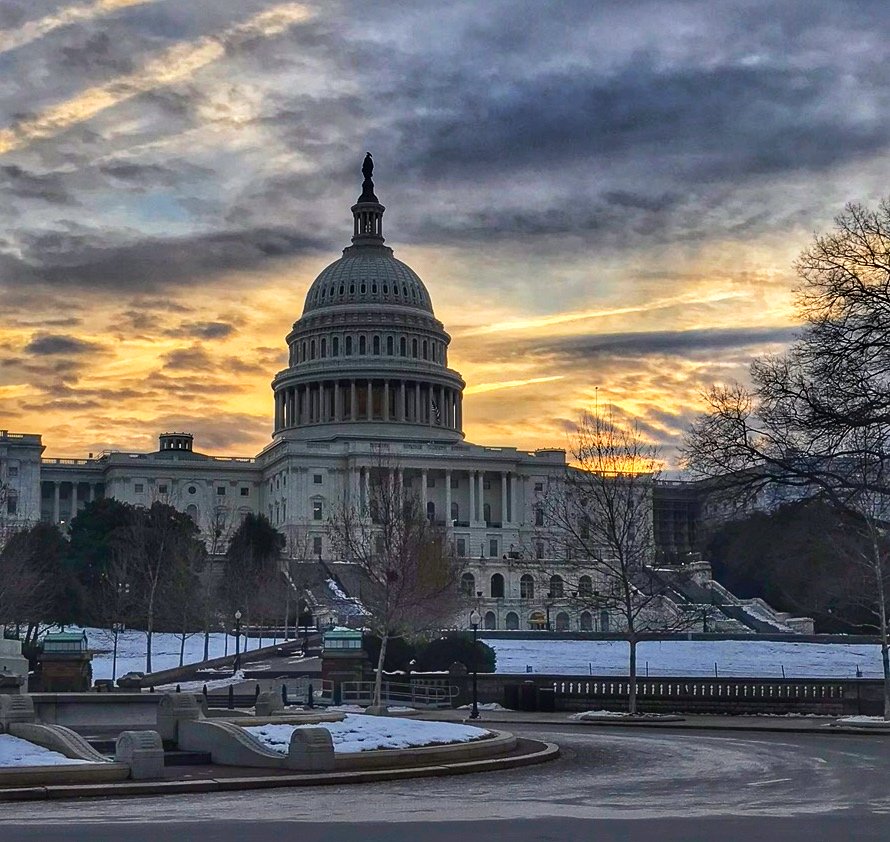
Maine craftsman to discuss lofty project he led
By Bob Keyes – For three years, Sen. Angus King of Maine observed the ongoing work to restore the cast-iron dome of the U.S. Capitol in Washington, D.C., unaware that a craftsman with ties to Maine was leading the effort to return the landmark to its magnificence.
He watched as a mountain of scaffolding was erected around the dome’s exterior, and each day sparked a new question in the senator’s mind about details, scope and challenges of the project. On Friday, King will have a chance to get answers to his questions, when he introduces Robert Baird of Brooklin at the 2019 Sparrow Lecture at Portland’s Mechanics’ Hall, presented by the Maine Charitable Mechanic Association. Full article here.
Broadway World | 4.17.19
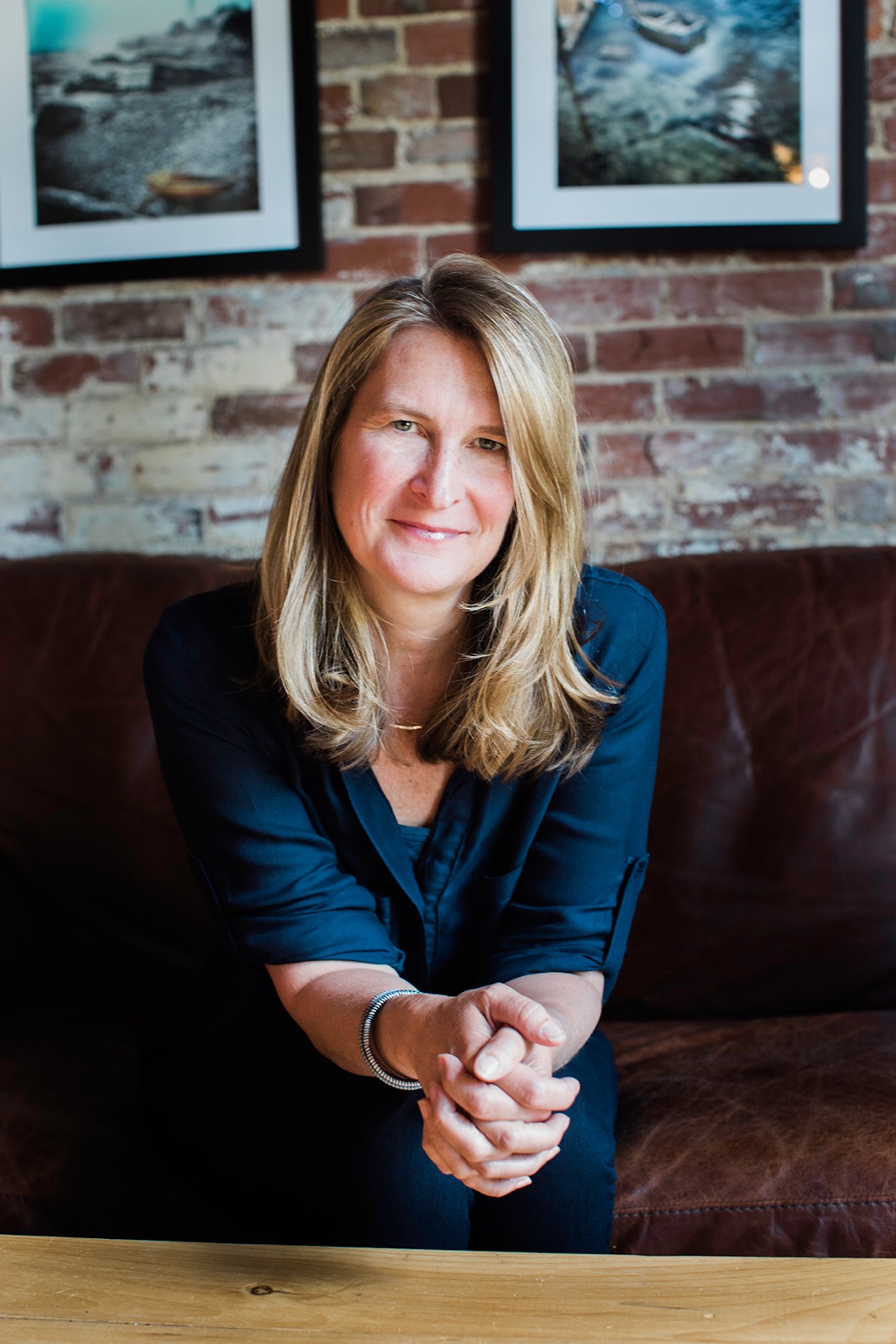
Mechanics’ Hall Names Annie Leahy as Inaugural Executive Director
PORTLAND, Maine – Mechanics’ Hall Board of Directors today announced the appointment of Annie Leahy as the organization’s inaugural Executive Director. Leahy will start her post on April 22nd. She joins Mechanics’ as the organization begins a process of planning for major building and facility improvements that will allow the Hall to present a wide variety of creative and artistic programs which honor the mission of the MCMA – to inspire and enrich the community by promoting ingenuity, creativity, innovation, and the diffusion of useful knowledge.
“We are thrilled that Annie has accepted this leadership position with Mechanics’ Hall,” said outgoing Board President Pam Plumb. “Throughout the interview process, she acknowledged our history, spoke to our mission, and articulated a strong programmatic vision for our future. Her experience, energy and drive will be a great asset to the organization.”
Leahy comes to Mechanics’ with over 20 years experience working at both for-profit and nonprofit organizations. She’s held senior positions in New York City at ABC News, the Tribeca Film Institute and the Tribeca Film Festival. She moved to Portland, Maine in 2009 as the Executive Producer and Director of Programming for PopTech. She currently serves as Board Chair at SPACE Gallery and is on the advisory board for Portland Bach Experience. Full article here.
MaineToday | 10.2.18
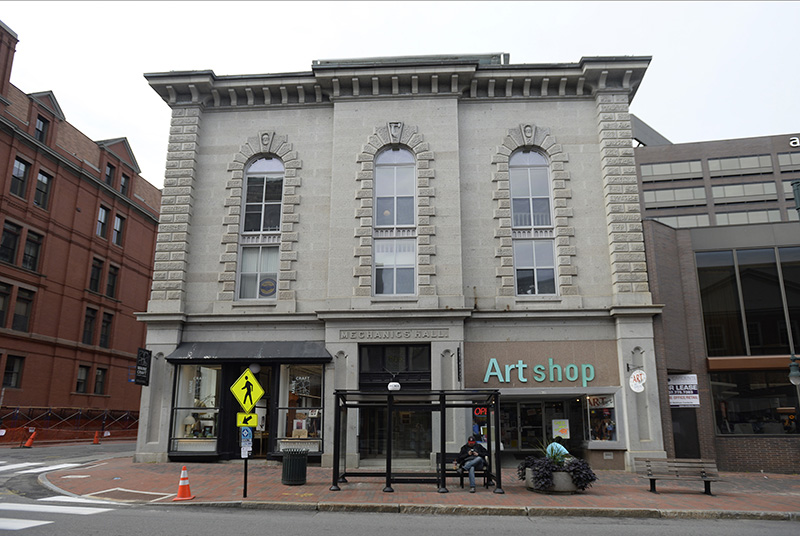
See Mechanics’ Hall in a New Light
By Bob Keyes – The Mechanics’ Hall in downtown Portland will be draped in color for the First Friday Art Walk when a Portland-based organization dedicated to reducing winter heating costs in Maine demonstrates how much heat the old building is losing and how much more efficiently it could operate.
The projection, presented by Passivhaus Maine, an organization that promotes low-energy construction, will be shown between 6 and 7:30 p.m. Friday. It is a stylized vision of the actual thermal imaging of the building, taken last February, showing hot spots where heat is seeping from the building and cooler spots where there’s better insulation to hold heat in and keep cold out. The projection lasts a little less than two minutes, and will be shown every 10 minutes or so, over the course of the evening. It also will include general information about the advantages of energy-wise construction and renovation, the pervasiveness of heat loss and what people can do about it. Full article here.
The Baysider | June 2017
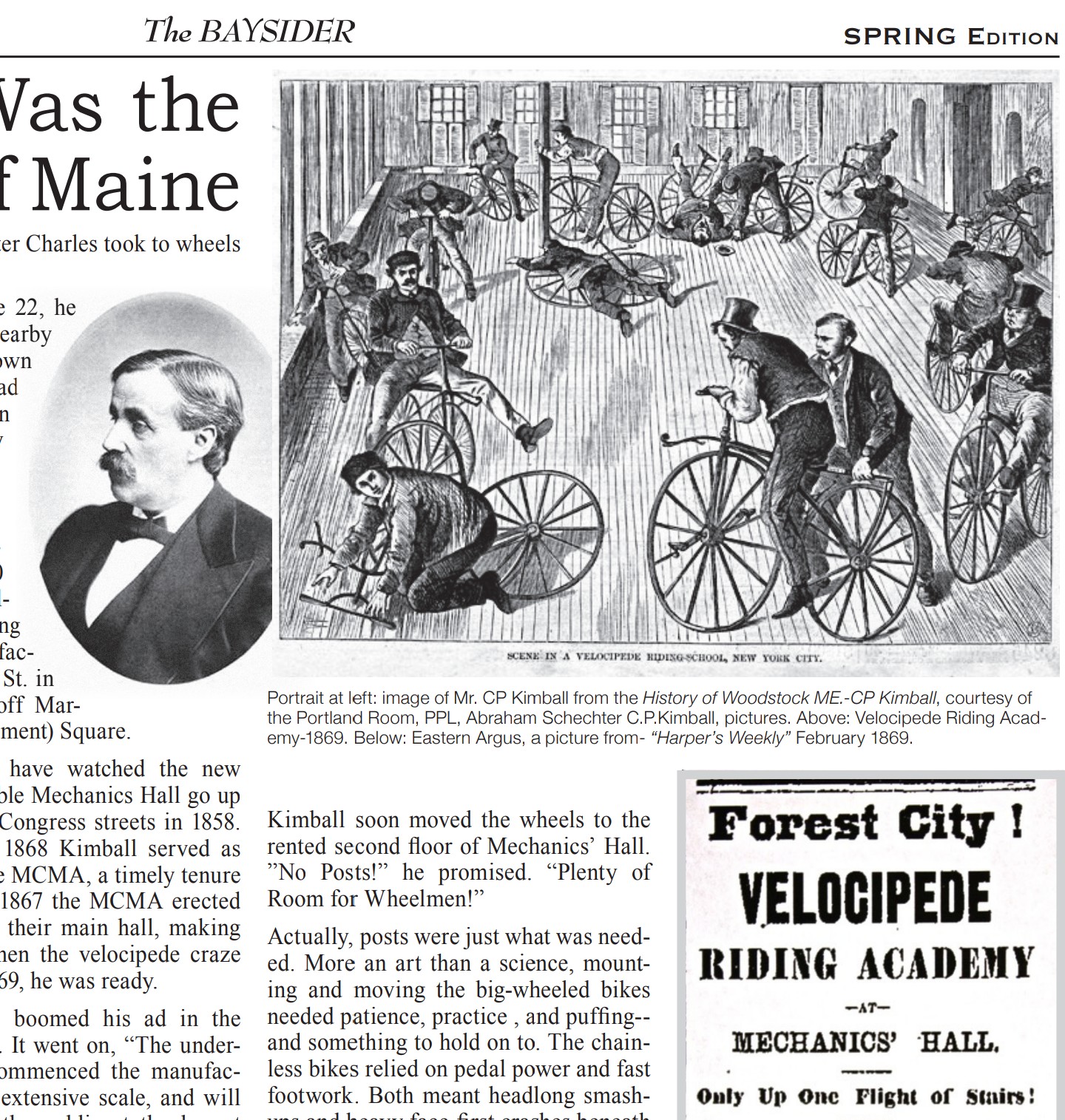
When Bayside Was the Bicycle Center of Maine
By Herb Adams – SPRING IS HERE bringing the 10-speeds out into Portland’s newly painted bike lanes and happy pedalers out in quest of health, fresh air, and faraway places.
As they whiz through Bayside, few know they travel hallowed ground, for here in Bayside was born the velocipede craze that bloomed into Maine’s long love affair with the bicycle. Full article here on page 8.
